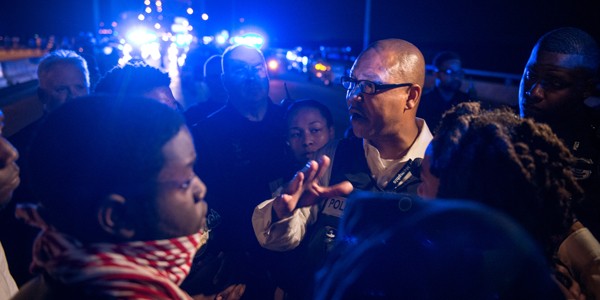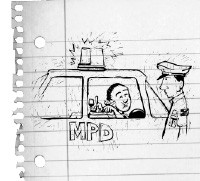What happens in Vegas stays in Vegas, but what happened in Miami in 2004 during three days and nights of partying involving John Ford, an undercover FBI agent, and their dates was courtroom fodder this week in Ford’s corruption trial.
Ford’s girlfriend, Mina Nicole Knox, 26, took the witness stand for nearly two hours as the defense closed out its case in short order. Ford did not testify, and the defense presented only three witnesses, including Knox, attorney Allan Wade, and Ford’s friend William Watson.
At Flyer press time, prosecutors were undecided whether to call a rebuttal witness. Otherwise, U.S. district judge Daniel Breen said the two sides would make closing arguments Tuesday afternoon and the case could go to the jury after that. The trial is in its third week.
Knox, who described her relationship with Ford as “personal,” is a petite former model and professional cheerleader and aspiring actress. She answered questions in a sweet, perky voice as defense attorney Michael Scholl and assistant prosecutor Lorraine Craig asked her about details of her weekend with Ford, Tim Willis, and undercover agent L.C. McNeil in Miami in July 2004. The weekend included a party aboard the now famous E-Cycle yacht, which was in fact an FBI prop, where undercover FBI agents smoked cigars, had drinks, and danced salsa with Knox and several of her male and female friends, including Ford.
Under questioning by Scholl, Knox told jurors that McNeil spent the night with one of her girlfriends in a hotel room and a second night with another woman from their party. McNeil testified last week that in his undercover role he “mirrored” Ford’s party style, but he insisted there was no sexual relationship, drug use, or anything “inappropriate” in his role-playing. In real life, McNeil is an ordained minister and specialist in undercover operations who said “it is a challenge to separate the two” lives he leads.
The weekend in Miami is important because it marked the beginning of the buddy-buddy relationship between Ford and McNeil and established the terms by which McNeil would pay Ford $55,000 in what the government says were bribes over the next nine months. Scholl spent more than three days cross-examining McNeil, who made all the payments and recorded them.
When it came his turn to present witnesses, however, Scholl elected to make it short and sweet. Wade, who represents developer Rusty Hyneman, said he never saw Hyneman give Ford an expensive Rolex watch and that Ford did not really save Hyneman any money on a state environmental matter, as Ford boasts on a secret tape. The other witness, a clothing designer who has known Ford for 20 years, also testified about the Rolex.
Then it was Knox’s turn. She said the purpose of the trip to Miami was to attend a black film festival. She did not recall hearing anything about E-Cycle Management. The defense contends Ford was targeted by the FBI and entrapped.
Prosecutors changed tactics by having Craig, instead of assistant U.S. attorney Tim DiScenza, handle the cross-examination. She asked Knox why three versions of the weekend in Miami that she wrote differed in detail, especially about McNeil’s implied romantic involvement. Knox said the first account was written hastily and in broad terms. Her final account of the weekend was written earlier this month just before the trial began. Craig suggested Ford might have coached Knox, but she denied having any help.
Jurors appeared to be listening intently to Knox, in sharp contrast to previous days in which witness testimony dragged on and was often interrupted by private conversations between the judge and lawyers. The courtroom was also unusually crowded with Ford supporters.
After Knox testified, there was a bench conference, after which Breen announced that the proof was complete unless the government decided during the lunch break to produce a rebuttal witness.
The anti-climactic end of the testimony left spectators and reporters guessing about the outcome and offering their opinions about the high and low points of the trial. With Ford declining to take the stand, the role of star witness must fall to either McNeil or undercover informant Tim Willis.
McNeil got the most face time, and the tapes of his payoffs to Ford were devastating, but for my money the trial’s most dramatic testimony came from Willis when he recounted his visit to Ford’s office in February 2005.
Willis was nervous, very nervous.
He had just gotten a call from Ford asking him to come to Ford’s office in downtown Memphis.
The call was short. Ford wanted to talk about one of Willis’ clients. Since Willis had only one client — E-Cycle Management — he could imagine what Ford was going to ask him: Are you working for the FBI?
Say what you will about Willis, he kept Operation Tennessee Waltz alive for three more months until the unveiling of the indictments on May 26, 2005. His commentary from the witness stand on the tape in which Ford threatens to shoot him was the signature moment in the trial.
The meeting at Ford’s office was Willis’ finest hour as an undercover informant. He outfoxed the fox in his own office, nervously shifting a miniature hidden recording device from one pocket to another while making up stories to counter each of Ford’s probes and keeping his nerve when Ford threatened to shoot him if he found out he was being betrayed.
At the time, Tennessee Waltz had been running for 15 months. Ford had been under suspicion since at least April 19, 2004, and had taken $40,000 in payments from an undercover FBI agent. Ford’s Memphis office was on the second floor of a small building on Third Street, with no easy access or interior observation points for FBI agents. Willis was on his own.
“I had a funny feeling about the call,” he testified.
So he called FBI agents Brian Burns and Mark Jackson, who told him to go ahead and to take a recorder with him.
After they talked awhile, Ford got down to business. How well did Willis know L.C. McNeil, the E-Cycle executive who had been paying Ford? What kind of contract did Willis have with E-Cycle? Was it for two years or three years? Where else did the company do business besides Tennessee?
“I’m just trying to figure out why they need a bill,” said Ford.
Then the big question: “Are they legit, man?”
Ford said Roscoe Dixon and two other unidentified people had warned him to be careful. Unknown to Ford, Dixon, hired a month earlier by Shelby County mayor A C Wharton as an administrative assistant, had been secretly taped for more than a year and had already been caught taking bribes from Willis. But Willis did not pay any bribes to Ford and testified that he didn’t even know Ford had been bribed when he went to his office that day.
To each question, Willis made up an answer. E-Cycle, he suggested, was a shell company for a get-rich-quick stock scheme. McNeil and his partner Joe Carson “hated each other,” and McNeil might be trying to sabotage the deal. McNeil grew up on the rough side of Chicago and might have been a drug dealer as a kid.
Ford wasn’t satisfied. The FBI has a lot of shell companies too, he countered.
“Let me ask you,” he said to Willis. “You ain’t workin’ for none of them motherfuckers?”
Ford whispered that he had a gun and said he would use it. Willis, as he had done several times before, broke into nervous laughter.
“He said he would shoot me dead and go tell my wife that I ran off with another woman,” he testified.
Ford was on the right trail but was missing enough pieces that Willis was able to talk his way out of the jam. The truth was worse than Ford suspected. McNeil was an FBI agent and instructor in undercover operations.
“The feds ain’t cut no deal with you?” Ford asked Willis, who had worked in his campaign in 2002.
In fact, that is exactly what they had done. Willis nervously shifted the recorder around in his pockets, sending static through the audiotape played for the jury.
As Willis was leaving, Ford threatened him again, telling him that if he was working for the FBI, “you gonna die right now.” He touched Willis on his shirt — Willis described it as a pat down — to see if he was wired, and Willis lifted up his shirt. As Willis walked down the stairs, Ford said, “It will not ever come back what you and I said.”
Little did he know that Willis would make it all come back. For the next three months, he never met with Ford again without an FBI agent in the room.
“We almost shut down the operation because of the threat,” Jackson testified.
Since he began cooperating with the government in 2003, Willis has been paid approximately $215,000. But on that day in February 2005 in Ford’s office, Willis was worth every dollar the government paid him.
 Brandon Dill
Brandon Dill  Brandon Dill
Brandon Dill  Greg Cravens
Greg Cravens